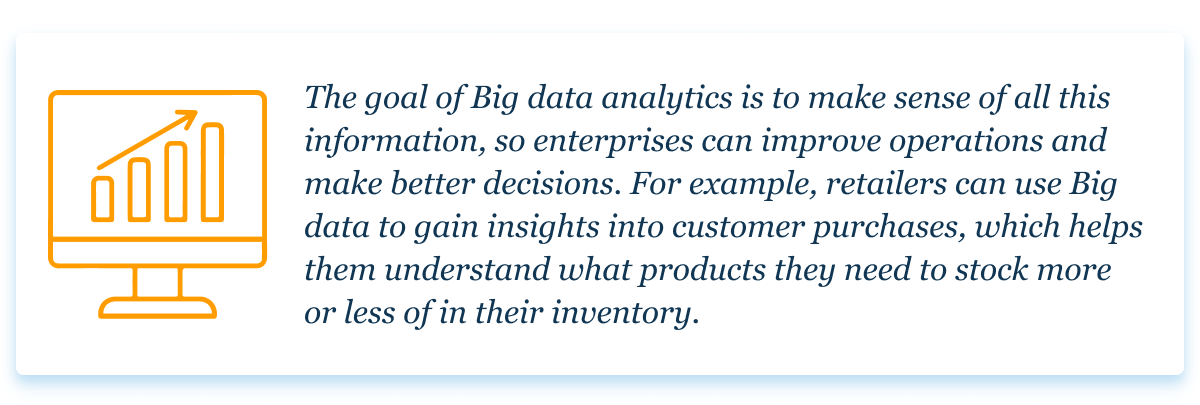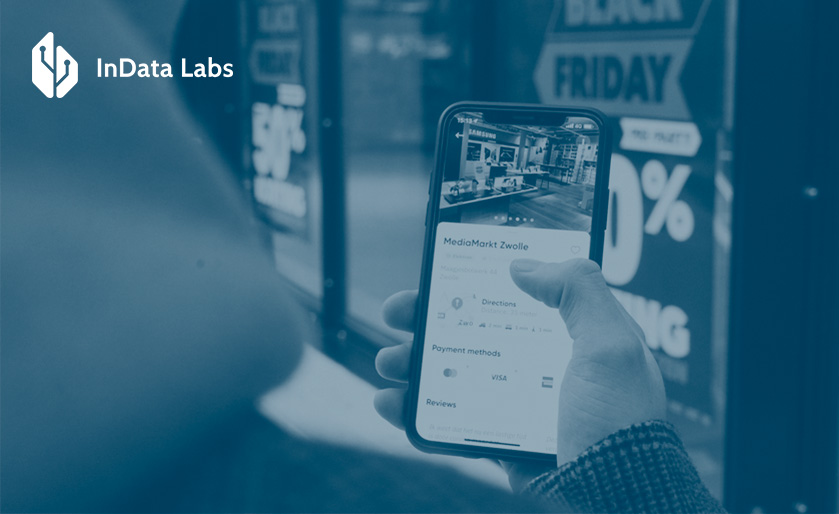Big data analytics in E-commerce is an evolving field. Retail companies adopt advanced analytical strategies and technologies to extract valuable insights from large volumes of data and improve overall business performance. This article discusses why commerce businesses should use Big data analytics and how it can help them achieve their goals.
Big data analytics & its application in E-commerce today
Big data refers to the large amounts of information that businesses collect and process every day. It can include sales figures, customer behaviors, social media statistics, and more. It’s estimated that by 2025, humans will create 175 zettabytes of data in the online realm. Companies should not underestimate the power of numbers when building their business strategies.

They can also measure the effectiveness of marketing campaigns by analyzing how many people clicked on ads or visited certain pages on their website after seeing them advertised elsewhere. The possibilities are limitless, but one fact is undeniable – without Big data, E-commerce businesses won’t be able to win with their competitors.
Why is Big data a must in E-commerce?
There are many reasons why Big data and E-commerce are such a good match. In fact, the ability to leverage insights from large volumes of data is one of the critical success factors of any online business. Big data analytics can showcase clearly which processes within the company are doing great and where are the areas for improvement. Thanks to that, enterprises can level up their game and become their customers’ number one choice.
The essential benefit of the analysis of Big data in E-commerce is the possibility to make data-driven decisions. One can see what activities are the most popular among customers, which types of content drive the most engagement, and what channels are the sources of the highest traffic volumes. When business owners know that, they are more likely to choose the right paths for growth.

Source: Unsplash
Big data also comes in handy when you want to give your customers a more individual treatment. According to Epsilon “80% of consumers are more likely to make a purchase when brands offer personalized experiences.” It’s the same for B2C and B2B customers: 73% of business shoppers also expect tailor-made experiences while purchasing. Companies that want to deliver high-level personalization have to know their clients inside out and Big data analysis is the best way to do that.
Relationship between Big data and marketing analytics
Another large area of business where Big data analytics can be useful is marketing. Promotional efforts paired with information about customers, their shopping behaviors, complaints, expectations, and desires can have a positive impact on a company’s performance and revenue.
Marketing analytics supported by Big data requires a deep understanding of statistics and various modeling techniques, but can definitely be one of the most effective ways to excel in any industry.

Source: Unsplash
Nowadays, companies have access to an unprecedented amount of data about their customers’ activities online. That’s thanks to website cookies, social media, and other third-party entities that collect, analyze, and share data with other brands to help them understand their clients better.

How is Big data used in the E-commerce industry?
There are many ways to use Big data in the E-commerce industry. All of them have one thing in common. They can be used to deliver a better user experience, improve sales, and optimize internal processes within the organization.
Here’s what Big data can be useful for when running an online retail business:
Customer analytics
Understanding clients better by analyzing their purchasing preferences. This information can be used to improve marketing campaigns, user experience, or product assortment.

Source: Unsplash
Personalization
Knowing customers inside out means they can receive individual product recommendations based on their previous purchases.
Also, the shopping process becomes simplified and supported by all sorts of data. Results? Improved customer satisfaction and increased sales by providing relevant products at the right time.
Offer optimization
By looking at the numbers, decision-makers can determine which of their products perform the best. They can also find out if their prices are attractive to customers.

Source: Unsplash
Boosted marketing
From improved SEO to increased traffic and revenue thanks to tailor-made marketing campaigns, data analysis is necessary for marketing teams that want to successfully help their company grow.
Security
Big data analytics, especially when automated, can quickly detect atypical patterns in payments, account activity, etc., and inform the clients about them.E-commerce shops that care about their customers’ safety are perceived as trustworthy and reliable.
Customer service
Recognizing the most common issues and fixing them quickly is the main duty of the customer service department.
With Big data, they can react to problems and solve them faster. Moreover, many errors can be prevented before they even occur.

Source: Unsplash
Future predictions
Big data is an ally when it comes to predictive analytics in retail and E-commerce. It can be used for forecasting trends and helping companies prepare for them. These reports are the crucial element of strategic planning sessions.
What is E-commerce website analytics?
One of the particular areas of E-commerce Big data analytics is dedicated to website analysis. Every online shop is a living organism that is constantly active. Not tracking your visitors, determining which parts of the website are clicked the most, or observing the customer journey can lead to negative consequences.
There are many analytical tools on the market that help companies get insights into their website traffic and customer paths. That allows sales teams, marketers, and other involved employees to get all the details they need: from clients’ location, age, and gender to the times they spend browsing products and knowledge on their favorite types of products.
With this information, E-commerce business owners can optimize their sites for specific keywords and target ads according to the detailed customer profile they’ve built with collected data.

Source: Unsplash
Here are the types of data worth collecting to utilize website analytics:
Who is an E-commerce data analyst?
To execute the Big data analytics strategy, an E-commerce business can hire a dedicated data analyst who will be responsible for implementing the right data collection process, improving it, and handling the acquired information.
Using their knowledge of statistics and other analytical methodologies, they can not only read the data but also interpret it and present proper conclusions.
An E-commerce data analyst needs to be able to work with large amounts of data and have a keen interest in how it affects different parts of the online retail business. They must also be able to communicate their findings clearly so that others can understand them easily. To be successful in this role, the potential candidate should:
- Know how to use required tools and big data applications in E-commerce
- Have experience with business intelligence (BI)
- Be able to present their conclusions to technical and non-technical people
- Be able to prepare informed and insightful presentations
- Know how to monitor market trends and compare them with their findings
- Know who are the company’s competitors and be able to analyze their moves
- Be able to evaluate sales and marketing activities based on the numbers
- Be able to recommend particular solutions based on their reports
- Know how to propose process improvements and new ways of data analysis.
What data does E-commerce use?
The truth is that there’s no one-size-fits-all answer to this question. Every business is unique, so each E-commerce company needs different types of information and different ways to analyze it.
That said, there are some general best practices that apply to Big data analysis for this particular industry:

Source: Unsplash
Product data
This information includes SKUs (Stock Keeping Units), product descriptions, pricing, and availability. All that is often maintained by manufacturers and can be used to improve product listings on your website.
One look at this metric will show you which of your products sell best and which ones are unprofitable. You should also collect reviews and rates in this section.
Vendor data
This refers to information about your suppliers. They should deliver detailed descriptions of products with photos and videos, full catalogs, delivery timescales, and payment terms.
This way, you will be able to manage your supply chain and stock levels, as well as calculate shipping costs better. It will also help you when there’s time to introduce new products in your store or plan seasonal events.

Source: Unsplash
Sales data
Sales records for each item sold in your store, including prices, quantities, discounts, and average order value, are essential to control several aspects of your E-commerce business. You can determine if the conversion rate is satisfying in terms of website visits resulting in a purchase ratio.
Also, it showcases particular tendencies among your customers and their buying patterns. For example, you might find out that you need to optimize pricing because your customers prefer to shop only when you send them special offers.
Customer data
Simply put, the information about who your audience is. It’s no secret that people from different age groups or living areas have completely different shopping behaviors.
Knowing exactly what are the traits of your store’s typical visitor will help you create better marketing campaigns and adjust the purchasing experience to your customers’ preferences. This area of your data analytics should also focus on shopping habits and brand loyalty.

Source: Unsplash
Main sources of Big data in E-commerce industry
To collect the enormous amounts of information required for big data analytics, E-commerce companies have to monitor numerous sources. Their own, internal numbers that come from the mentioned above areas of business, are only the beginning of this process. There are so many ways to collect data, so picking the right ones that are relatable to your enterprise is crucial to get relevant and meaningful results.
Here are several examples of places you should check to find useful data for your online store:
- Search engine results: by browsing the most popular terms that have something in common with your business, you can find additional keywords and phrases for SEO positioning and content creation. Competitors: analyzing their online presence, store offers, and marketing activities will help you to understand better what gives your rivals an advantage and improve your strategy to beat them.
- Social media: from your potential customers to loyal shoppers, social platforms are a source of helpful knowledge. Their posts, reviews, and engagement with your brand can showcase what you do right, what needs improvement, and what will be the next industry trends.
- Comparison websites: portals dedicated to price comparison will come in handy when you want to determine if your pricing strategy is right. It’s also another source of wisdom about your competition.
- Tools: Google Analytics, Google Trends, and more niche platforms are great for monitoring various aspects of your business and the industry in general. You will know exactly what’s happening on your website and what customers are discussing online.
Imagine collecting and processing all of this information manually! It would be extremely time-consuming, not to mention exhausting for your team.
In the hectic times we live in right now, real-time analytics are crucial, which also means doing all the work by hand has no use.
A unified data analytics solution can automate all the big data operations, helping with prompt decision-making and giving your brand a competitive advantage.
How can data analytics help in E-commerce?
Big data analytics can be a powerful tool in E-commerce, but it can also cause major problems if not used properly. That’s because wanting to process such large quantities of data with so much variety requires special techniques and frameworks to be done properly. Traditional means have no use here.
With Big data development services, it’s possible to analyze every click and purchase made by customers, which gives valuable insight into their shopping habits. This could lead to important business changes, such as finding new ways to make money from the same inventory.
The goal of Big data analytics is simple – to help companies make better decisions based on their existing data sets.

Source: Unsplash
For example, analyzing customer-related data can demonstrate if the personas determined within the company’s strategy are actually the ones the store should target.
Sometimes you can think that your product is perfect for people with certain attributes, but it will be more attractive to a completely different audience. Big data analytics can help you discover missed opportunities and help you act accordingly.
Retailers can and should use data analytics to:
Understand their customers
Online sellers need to know what their clients want and how they want it. They need to create personalized experiences based on data, including their spending habits, shopping preferences, interests, and other information.
Doing all that will result in higher conversion rates, increased customer satisfaction, and growing revenue.

Source: Unsplash
Improve marketing campaigns
The more accurately online stores can target their marketing efforts, the more likely they will be to reach the right audience at the right time with the right message.

Personalize customer service
Data analytics allows an online retailer to offer individual services based on each customer’s needs.
Personalized interactions ensure that customers keep coming back because they feel valued as individuals rather than just another number on a spreadsheet somewhere in corporate headquarters. Such an approach leads to higher levels of customer retention and loyalty, which is crucial for steady profits.
Reduce costs
By analyzing customer behavior patterns over time, retailers can predict when certain products are likely to sell out or when popular items need restocking, so they won’t have empty shelves during peak shopping periods.
Process optimization also allows internal teams to be more productive and focused on delivering the best results instead of spending their time on repetitive tasks. It all leads to lower operational costs.

Source: Unsplash
Does Big data influence the online shopping process?
According to Statista’s predictions, the E-commerce market will constantly grow in the upcoming years. In 2026, it will be worth more than $8 billion.
The world has changed dramatically in the last decade. Complexity (that comes from digitalization, technological development, and many more factors) is increasing at a rapid rate, and it’s forcing businesses to rethink their strategies.
The final thought
Companies are no longer able to rely on traditional methods of market research and marketing. They need to adopt new technologies that allow them to compete in the global marketplace – one of them being Big data analytics. The large amounts of information we generate and process daily have a definite impact on the shopping processes and other areas of E-commerce, business, and people’s lives.
Research shows that Big data can have both positive and negative influences on the purchasing experience. It suggests that companies can become more customer-centric thanks to Big data analysis, but they also have to be cautious when it comes to personal data usage and cybersecurity. They also have to bet on authenticity and honesty in marketing, instead of selling products no matter what.
Buyers become more sensitive to aggressive advertising and big data can be a company’s friend when it comes to preparing strategies that are dedicated to building genuine relationships with them.
Big data is one of the most prominent trends in retail and E-commerce for 2023 and beyond, together with automations delivered by AI and machine learning. Being aware of the possibilities it offers allows companies to elevate their businesses and reach their goals in all aspects of online retail.
Custom AI solutions for E-commerce
In need of Big data analytics services for your E-commerce business? We can help you with that. Reach out to our specialists and let us know what we can do for you.




